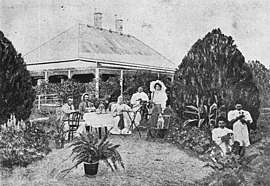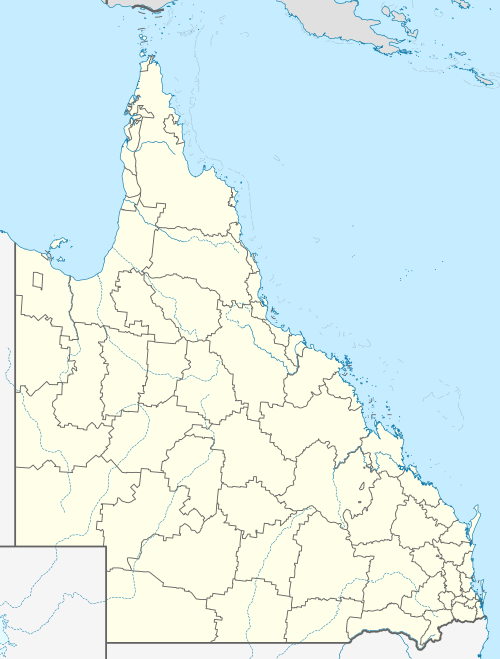Cornish Creek, Queensland
Cornish Creek is a former rural locality in the Barcaldine Region, Queensland, Australia.[2] In the 2016 census, Cornish Creek had a population of 16 people.[1]
| Cornish Creek Queensland | |||||||||||||||
|---|---|---|---|---|---|---|---|---|---|---|---|---|---|---|---|
 Tea party at Mount Cornish Station, 1898 | |||||||||||||||
 Cornish Creek | |||||||||||||||
| Coordinates | 22.4497°S 144.7780°E | ||||||||||||||
| Population | 16 (2016 census)[1] | ||||||||||||||
| • Density | 0.00845/km2 (0.0219/sq mi) | ||||||||||||||
| Postcode(s) | 4732 | ||||||||||||||
| Area | 1,892.5 km2 (730.7 sq mi) | ||||||||||||||
| Time zone | AEST (UTC+10:00) | ||||||||||||||
| Location |
| ||||||||||||||
| LGA(s) | Barcaldine Region | ||||||||||||||
| State electorate(s) | Gregory | ||||||||||||||
| Federal Division(s) | Maranoa | ||||||||||||||
| |||||||||||||||
On 22 November 2019 the Queensland Government decided to amalgamate the localities in the Barcaldine Region, resulting in five expanded localities based on the larger towns: Alpha, Aramac, Barcaldine, Jericho and Muttaburra. Most of Cornish Creek was incorporated into Muttaburra, except for a small part of eastern Cornish Creek which was incorporated into Aramac.[3][4][5]
Geography
The Thomson River forms the south-western boundary of the locality. Cornish Creek flows through the locality from east (Upper Cornish Creek) to west (Tablederry) where it becomes a tributary to the Thomson River. All watercourses in the locality flow into the Lake Eyre drainage basin.[6]
The Muttaburra Aramac Road enters the locality from the west (Muttaburra) and passes through the locality exiting to the south (Sardine). Crossmore Road enters the locality from the south-west (Muttaburra) and has its junction with the Muttaburra Aramac Road within the locality.[6]
History
Cornish Creek is part of the traditional tribal lands of the Iningai. Iningai (also known as Yiningay, Muttaburra, Tateburra, Yinangay, Yinangi) is an Australian Aboriginal language spoken by the Iningai people. The Iningai language region includes the landscape within the local government boundaries of the Longreach Region and Barcaldine Region, particularly the towns of Longreach, Barcaldine, Muttaburra and Aramac as well as the properties of Bowen Downs and catchments of Cornish Creek and Alice River.[7]
The locality is named after the creek, which was in turn named in 1860 by explorer William Landsborough after his business partner Edward Cornish.[2]
Heritage listings
Cornish Creek has a number of heritage-listed sites, including:
Education
The nearest primary schools are in Muttaburra and Aramac. The nearest secondary schools are in Aramac (to Year 10 only) and in Winton, Longreach and Barcaldine (all to Year 12).[6]
References
| Wikimedia Commons has media related to Cornish Creek, Queensland. |
- Australian Bureau of Statistics (27 June 2017). "Cornish Creek (SSC)". 2016 Census QuickStats. Retrieved 20 October 2018.

- "Cornish Creek - locality in Barcaldine Region (entry 47075)". Queensland Place Names. Queensland Government. Retrieved 10 June 2019.
- "Recent place name decisions". Queensland Government. 22 November 2019. Archived from the original on 22 October 2019. Retrieved 15 January 2020.
- "Proposed Locality Boundaries and Names: Barcaldine Regional: Alpha, Aramac, Barcaldine, Jericho and Muttaburra" (PDF). Queensland Government. 17 May 2019. Archived from the original (PDF) on 15 January 2020. Retrieved 15 January 2020.
- "Locality Boundaries and Names: Barcaldine Regional Council: Alpha, Aramac, Barcaldine, Jericho and Muttaburra" (PDF). Queensland Government. 17 May 2019. Archived from the original (PDF) on 15 January 2020. Retrieved 15 January 2020.
- "Queensland Globe". State of Queensland. Retrieved 4 August 2019.
- "Iningai". State Library of Queensland. Retrieved 15 January 2020.
- "Mt Cornish Homestead (entry 600009)". Queensland Heritage Register. Queensland Heritage Council. Retrieved 6 July 2013.